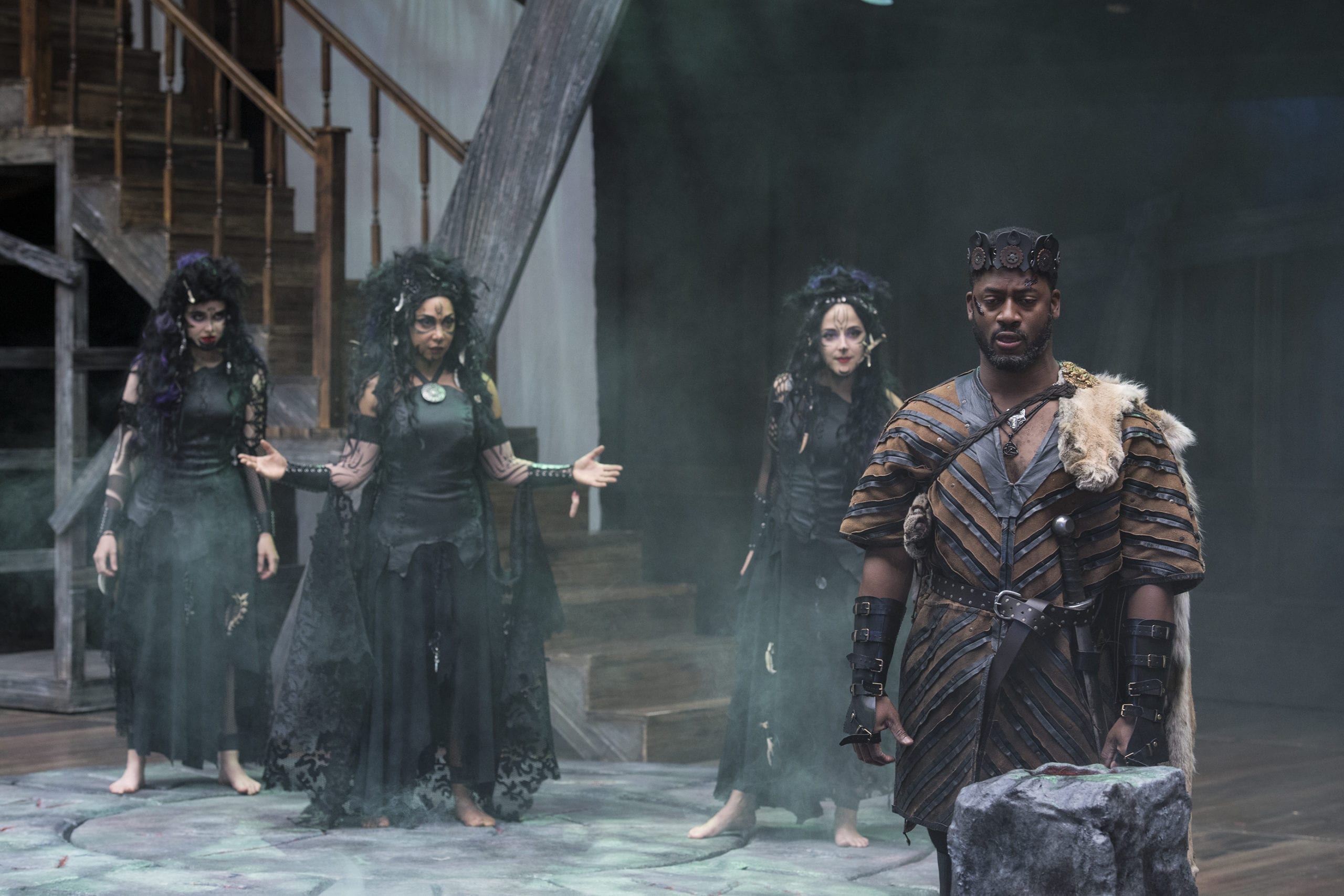CEDAR CITY — There is only one word to describe the current production of Macbeth at the Utah Shakespeare Festival: engrossing. Nearly every scene is a triumph of directing and acting that makes it obvious why Macbeth is one of Shakespeare‘s greatest tragedies.

Director Melissa Rain Anderson is a master of the stage picture, and frequently I wanted to stop the action and take a photograph because of the artful way that Anderson had arranged her actors. Whether it was the banquet scene with its Renaissance symmetry or the synchronous movements of the witches, Anderson created visually appealing scenes that easily grabbed my attention. I also appreciated the way that Anderson added ritual to the play, especially when Lady Macbeth called upon demons to “unsex” her or when Macbeth asked demons to strengthen him. Finally, Anderson was effective in putting the “horrible imaginings” of Shakespeare’s script on stage, with the murder of Lady Macduff and the appearance of the ghost of Banquo being gruesome yet compelling to see.
Helping Anderson in creating a visual spectacle was costume designer David Kay Mickelsen, whose costumes were lovely and yet believably functional. The men’s cloaks looked ideal for the chilly Scottish evenings, and the tunics for the warriors prioritized freedom of movement—just as a soldier fighting in hand-to-hand combat would want. Mickelsen also created eerie witches with tattered black dresses and fishnet stockings. The look Mickelsen gave these witches fulfilled every expectation I had for these iconic Shakespeare characters.

In the role of Macbeth, Wayne T. Carr was nothing short of stellar. His command over Shakespeare’s language was so complete that Carr made the dialogue feel completely modern. Carr also had a firm grasp of Macbeth’s psychology and an uncanny knack at subtlety showing the character’s inner struggles, especially when Macbeth was contemplating the decision to murder King Duncan. This emotional turmoil was in great contrast to the unbounded confidence and hubris of Macbeth in Act V when he believed that he was invincible, and Carr gave Macbeth a gradual, believable transformation in mannerisms that was one of the best aspects of the play. Most fascinating, however, was the innovative decision to make Macbeth ungrateful in Act IV in response to the witches prophecy that his children will not be kings. It was a reaction to the vision that I had never seen before.

Matched with Carr in every way was Katie Cunningham as Lady Macbeth. Her intense, passionate line deliveries and eagerness to fulfill the witches’ prophecy gave her scenes an urgency that added to the show’s emotional tension. Cunningham’s range of reactions to the play’s events was exquisite, whether it was the near-panic when discovering that Macbeth still carried the weapon used to murder King Duncan (instead of using it to incriminate the king’s guards), or the controlled nervousness when Macbeth seemed to go mad when he saw Banquo’s ghost. The famous Act V sleepwalking scene, which Cunningham used to effectively show Lady Macbeth tortured by her guilt after Duncan’s murder, was simply captivating. The scene showed Lady Macbeth reliving that fateful night and being deeply pained by the anguish she felt.
While Carr and Cunningham were superb individually, their scenes together were the best in the play. The two had a believable relationship as a married couple, whether it was in the joy in their reunion or the way that Lady Macbeth knew exactly how to goad her husband into doing her bidding. Each performer was capable of pulling out a stronger performance from the other, and it was a joy to watch these two evenly matched, talented actors.

The supporting cast was worthy of sharing the stage with Cunningham and Carr, though the smaller roles meant the supporting cast had fewer moments to shine. Still, several did manage to make themselves memorable. As Malcolm, Christopher Peltier’s ardent pleas in Act IV to Macduff for help in overthrowing Macbeth made Malcolm more concerned about the well-being of Scotland than in his personal gains from inheriting the throne. Also, the three witches (played by Sarah Hollis, Emma Geer, and Betsy Mugavero) seemed to ooze malevolence, with their unnatural physical movements and intense (almost seductive) stares at Macbeth.
The only supporting cast member who didn’t wow me at least once was Michael Elich as Macduff. Nothing Elich did was bad, and his mix of grief and anger when Macduff learned that his family had been murdered was appropriate. However, most of Elich’s scenes consisted of predictable reactions and a consistent tone in his line deliveries. It was a sufficient performance, but in a cast this strong, “sufficient” looked weak.
At just two hours (not including a 10-minute intermission), this Macbeth is a whirlwind of a production that grabs its audience forcefully and never lets go. Anderson and her virtuoso cast have created a production that displays the consequences of being “sick at heart.” I can, without reservation, recommend this Macbeth to any audience member, whether they are a Shakespeare novice or aficionado. An equally engrossing Macbeth is not going to happen in the near future . . . or so the witches tell me.
[box]The Utah Shakespeare Festival production of Macbeth plays various dates at 8 PM through September 12 in the Engelstad Shakespeare Theatre on the campus of Southern Utah University. Tickets are $20-77. For more information, visit their website.[/box]
